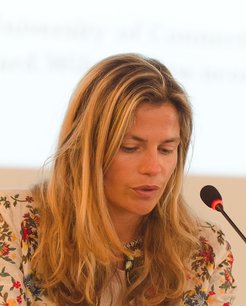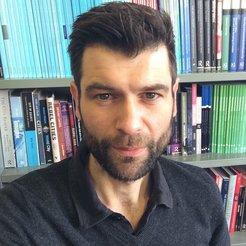The Accompanying Scientific Committee
People | Accompanying Scientific Committee | Projects | Activities
Maria Sapignoli

Dr. Sapignoli after heading the Max Planck independent research group AIming Toward the Future: Policing, Governance, and Artificial Intelligence, took up a tenure track professorship in social and cultural anthropology at the University of Milan and remained co-operation partner at the Institute. She is a socio-cultural anthropologist who has spent the past decade conducting ethnographic fieldwork in southern Africa as well as in several international organizations, including the United Nations. She has explored topics of institutional reform, indigenous and minority rights, social movements and advocacy and, ultimately, justice. Maria’s most recent research investigates how artificial intelligence and related technologies are being conceptualized, developed, transferred, and applied in governance and in the context of the intensification of state and non-state policing. Her projects engage critically and collaboratively with the legal and social challenges and opportunities presented by the use of digital technologies and big data in society and in environmental governance. They also shed light on the human creators of such technologies, including the values and aspirations that become codified in the programs they develop. She is co-editor of Palaces of Hope: The Anthropology of Global Organizations (Cambridge University Press 2017), of the Oxford Handbook of Law and Anthropology (Oxford University Press forthcoming 2021), and the author of Hunting Justice: Displacement, Law, and Activism in the Kalahari (Cambridge University Press 2018). She has also published numerous articles and book chapters.
Peter Fussey

Professor Fussey’s research focuses on surveillance, digital sociology, algorithmic justice, human rights, intelligence oversight, technology and policing, and urban studies. He has published widely across these areas. The author and editor of six books, he is a director of the Centre for Research into Information, Surveillance and Privacy (CRISP), and research director for the six-year ESRC funded Human rights, Big Data and Technology project (hrbdt.ac.uk). He is experienced in public and media engagement and his award-winning research has been covered by BBC Newsnight, PBS Newshour (US), Nature, The New York Times, The Times, The Financial Times, The Guardian, La Repubblica, Le Monde, BBC Radio 4 (PM & File on Four) and other national news outlets across the world. Professor Fussey has also worked with public bodies across the EU on the regulation of overt and covert surveillance, with UN agencies on human rights in the digital age, leads the ‘ethics, human rights and technology’ strand of the UK’s national Surveillance Camera Commissioner’s Strategy and recently led the independent review of the London Metropolitan Police trials of facial recognition technology.
More information on Peter Fussey.

